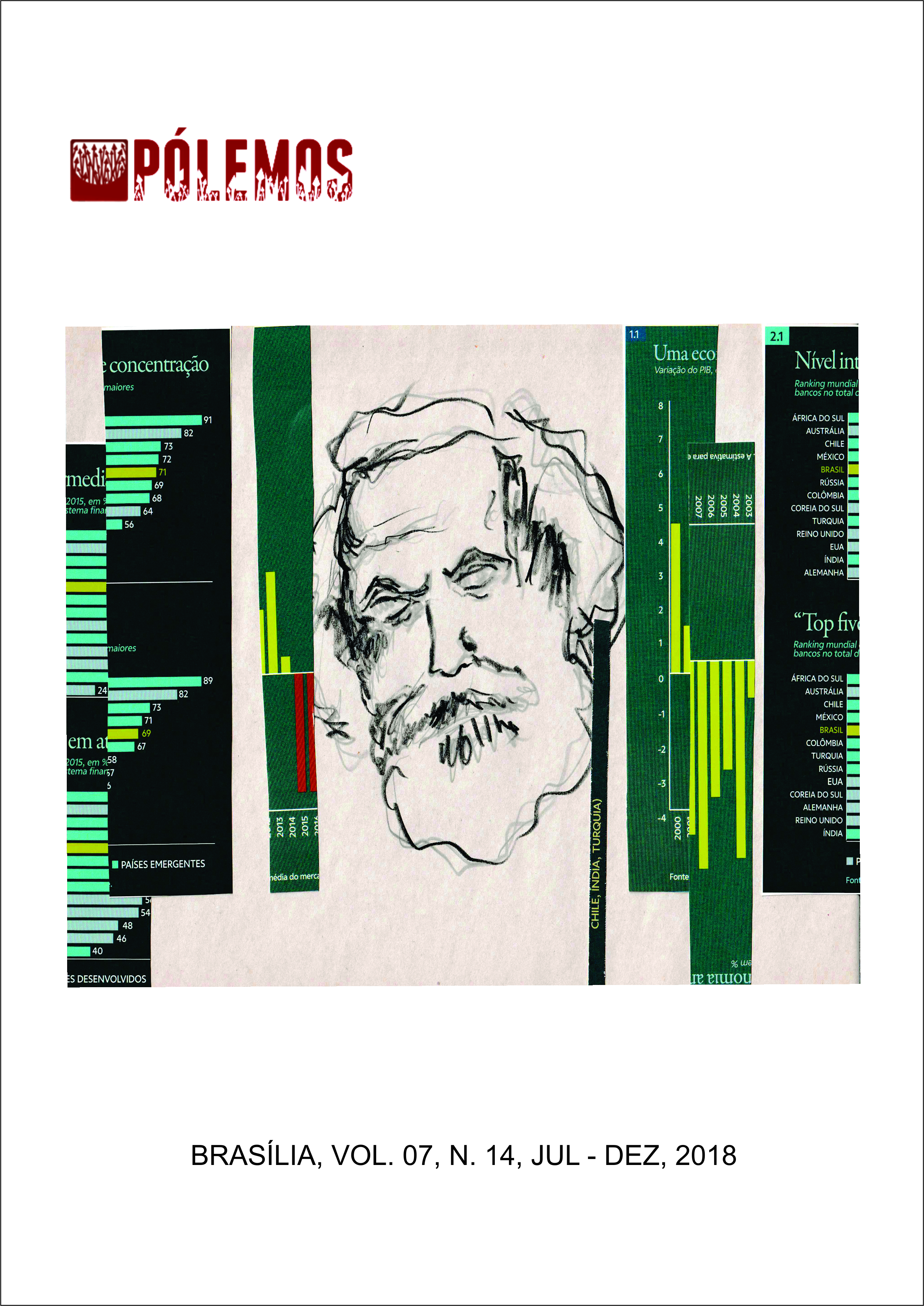ADORNO’S NEGATIVE DIALECTICS AS A PHILOSOPHY OF REAL POSSIBILITY
DOI:
https://doi.org/10.26512/pl.v7i14.23365Keywords:
Negative Dialectics, Philosophical Materialism, Freudian Metapsychology, Ontological Proof, Critique Of Labor.Abstract
This article examines some aspects of Adorno’s materialist dialectic, by focussing especially on his
Hegel: Three Studies. While Adorno’s philosophy is commonly read ”“ both by Habermasian critics
and more sympathetic readers ”“ as a “critique of instrumental reason” aiming at a mere refutation of
Hegel’s subject-object identity thesis, it is suggested here that this thesis plays a crucial role in Adorno
as a dialectical moment. First Adorno’s view of the objective essence of dialectics is outlined,
implying that materialist elements are already present in Hegel himself. The trascendent possibility of
utopia must be conceived, therefore, as a “real possibility”, grounded in the structure of immanent
experience. Then the question is posed of what, according to Adorno, is actually false in Hegel.
Through a survey on some core concepts of negative dialectics ”“ the ontological proof of God’s
existence, the object’s preponderance, the contingency of antagonism, the historical genesis of the
Freudian ego ”“ it is shown that Adorno’s critique to Hegel is directed at the idealist ontologization of
labor, and therefore, of subject ”“ itself a form of labor. Finally, a possible pratical outcome of negative
dialectics is briefly hinted at, consisting in the overcoming of labor through labor, i.e., in a conception
of the abolition of the commodity form that is dialectical, negative, and based on the acceptance of the
rule of law.
Downloads
References
Adorno, Theodor W (1973). PhilosophischeTerminologie. 2 voll. Frankfurt a.M.: Suhrkamp.
Adorno, Theodor W (1977). The Actuality of Philosophy. “Telos”, 31, pp. 120-33.
Adorno, Theodor W (1991). Notes to Literature. Vol. 1. Trad. S. Weber Nicholsen. New York: Columbia University Press.
Adorno, Theodor W (1992). Minimamoralia. Reflexões a partir da vida danificada. Trad. L.E. Bicca, rev. G. de Almeida. São Paulo: Ática.
Adorno, Theodor W (1995). Palavras e sinais. Modelos críticos 2. Trad. M.H. Ruschel. Petrópolis: Vozes.
Adorno, Theodor W (2007). Para a metacrítica da teoria do conhecimento. Estudos sobre Husserl e as antinomias fenomenológicas. Trad. M.A. Casanova, rev. E. Socha. São Paulo: Editora UNESP.
Adorno, Theodor W (2009). Dialética negativa. Trad. M.A. Casanova, rev. E. Soares Neves da Silva. Rio de Janeiro: Jorge Zahar.
Adorno, Theodor W (2010). Einführung in die Dialektik. Ed. C. Ziermann. Frankfurt a.M.: Suhrkamp.
Adorno, Theodor W (2015a). Três Estudos sobre Hegel. Trad. F. López Toledo Corrêa. Dissertação de Mestrado não publicada. UNIFESP (SP).
Adorno, Theodor W (2015b). Ensaios sobre psicologia social e psicanálise. Trad. V. Freitas. São Paulo: Editora UNESP.
Adorno, Theodor W (2018). Primeiros escritos filosóficos. Trad. V. Freitas. São Paulo: Editora UNESP.
Arantes, Paulo Eduardo (1990). Tentativa de identificação da Ideologia Francesa. Uma introdução. “Novos Estudos”, 28, pp. 74-98.
Benjamin, Walter (2008). A tarefa do tradutor, em: L. Castello Branco (org.). A tarefa do tradutor, de Walter Benjamin: quatro traduções para o português. Belo Horizonte: Fale/UFMG.
Bowie, Andrew (2013). Adorno and the Ends of Philosophy. Cambridge (UK): Polity Press.
Buck-Morss, Susan (1977). The Origin of Negative Dialectics. Theodor W. Adorno, Walter Benjamin, and the Frankfurt Institute. New York: The Free Press.
Buck-Morss, Susan (1985). Die neue Unübersichtlichkeit. Frankfurt a.M.: Suhrkamp.
Habermas, Jürgen (1999). Teoria de la acción comunicativa. Vol. 1. Trad. M. Jiménez Redondo. Madrid: Taurus.
Habermas, Jürgen (2000). O discurso filosófico da modernidade. Trad. L.S. Repa, R. Nascimento. São Paulo: Martins Fontes.
Jaeggi, Rahel (2005). »Kein Einzelner vermag etwas dagegen«. Adornos Minima moraliaals Kritik von Lebensformen, in: A. Honneth (ed.), Dialektik der Freiheit. Frankfurter Adorno-Konferenz 2003. Frankfurt a.M.: Suhrkamp, pp. 115-141.
Kurz, Robert (2008). O colapso da modernização. Da derrocada do socialismo de caserna à crise da economia mundial. Trad. K. Elsabe Barbosa. São Paulo: Paz e Terra.
Marx, Karl (2004). Manuscritos econômico-filosóficos. Trad. J. Ranieri. São Paulo: Boitempo.
Marx, Karl; Engels, Friedrich (2003). A sagrada família ou A crítica da Crítica crítica (contra Bruno Bauer e consortes). Trad. M. Backes. São Paulo: Boitempo.
Müller-Doohm, Stefan (2005). Adorno. A Biography. Trad. R. Livingstone. Cambridge (UK): Polity Press.
Nuzzo, Angelica (2008). Dialettica negativa e dialettica speculativa. Adorno ed Hegel. Em: L. Pastore, T. Gebur (org.). Theodor W. Adorno. Il maestro ritrovato. Roma: manifestolibri, pp. 154-80.
O’ Connor, Brian (2004). Adorno’s Negative Dialectic. Philosophy and the Possibility of Critical Rationality. Cambridge (Mass.), and London: The MIT Press.
Petrucciani, Stefano (2004). Un pensiero sul margine del paradosso. Em: Th. W. Adorno, Dialettica negativa. Torino: Einaudi, pp. XI-XXVII.
Reichelt, Helmut (2008): Oggettività sociale e critica dell’economia politica: Adorno e Marx. Em: Theodor W. Adorno. Il maestro ritrovato, cit., pp. 223-41.
Safatle, Vladimir (2012). Grande Hotel Abismo. Por uma reconstrução da teoria do reconhecimento. São Paulo: Editora WMF Martins Fontes.
Sherratt, Yvonne (2007). Adorno’s Positive Dialectic. Cambridge (UK): Cambridge University Press.
Sommer, Marc Nicolas (2016). Das Konzept einer negativen Dialektik. Adorno und Hegel. Tübingen: Mohr Siebeck.
Whitebook, Joel (1995). Perversion and Utopia. A Study in Psychoanalysis and Critical Theory. Cambridge (Mass.): The MIT Press.
Wolff, Ernst (2006). From Phenomenology to Critical Theory. The Genesis of Adorno’s Critical Theory from his Reading of Husserl. “Philosophy and Social Criticism”, 32, pp. 555-72.
Zanotti, Giovanni (2015). Objective Being as Non-Identity. On Marx’s and Adorno’s Critiques of Hegel. “Hegel-Jahrbuch”, pp. 232-40.
Zanotti, Giovanni (2016). Contingent Antagonism. A Key to Adorno’s Dialectic. “Discipline filosofiche”, XXVI, 2, pp. 139-50.
Downloads
Published
How to Cite
Issue
Section
License
Copyright (c) 2018 PÓLEMOS ”“ Revista de Estudantes de Filosofia da Universidade de Brasília

This work is licensed under a Creative Commons Attribution-NonCommercial-NoDerivatives 4.0 International License.
Todos os trabalhos que forem aceitos para publicação, após o devido processo avaliativo, serão publicados sob uma licença Creative Commons, na modalidade Attribution-NonCommercial-NoDerivatives 4.0 International Public License (CC BY-NC-ND 4.0). Esta licença permite que qualquer pessoa copie e distribua a obra total e derivadas criadas a partir dela, desde que seja dado crédito (atribuição) ao autor / Ã autora / aos autores / às autoras.


